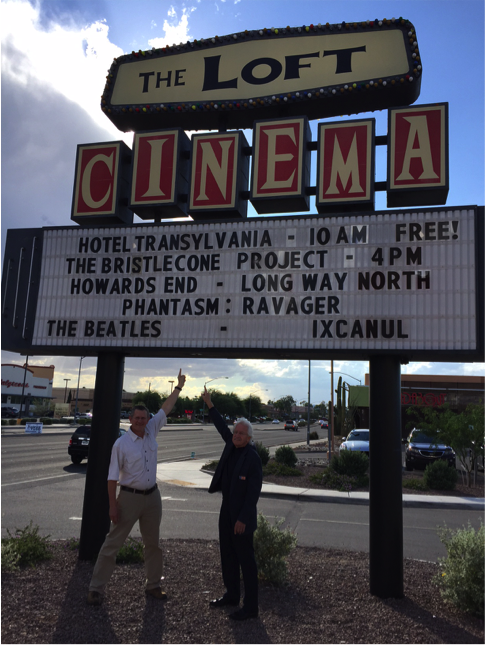You can leave this site quickly.
Learn more about Internet safety.
Three Lessons in the Meaning of Community
On Wednesday, October 5th, I flew over the beautiful, rugged landscape of western New Mexico, bound for Phoenix. I looked ahead to an intense four days in Arizona – three public events plus a clinical evaluation of a man facing capital murder charges. Like many such trips, I looked ahead to a mixture of non-stop stimulation and exhaustion.
My forecast was only partly right. Non-stop stimulation: yes. Exhaustion: no. What I did not foresee was that my four days in Arizona would present me with three resounding lessons in the meaning of community; three lessons in what developmental psychologist Erik Erikson described as one of the pinnacles of maturation: the capacity to care for those outside of ourselves, to care for our communities, and to embody “generativity, ” the concern for establishing and guiding the next generation.
Lesson 1: Phoenix

The first event was a screening of the Bristlecone documentary film sponsored by a consortium of Arizona anti-trafficking organizations. The 30-minute film features many of the Bristleconevolunteers describing their struggles and their triumphs along the road to healing from sexual abuse and assault. It is emotionally evocative, and it spawned 90 minutes of questions and discussion from the audience of nearly 100 professionals and activists from across the state. Among the questions: have any Native American men volunteered for the project? The answer was “no, not yet.”
As the event wound down and I was packing up my gear, one of the event’s organizers, Kathleen Winn, came up to me and said, “There’s someone you need to meet.” She meant it, and she arranged it. Less than 24 hours later, I was sitting in the office of a Hopi elder, engaged in an intense discussion about the possibility of a Bristlecone-type project for the Native American community. Our second discussion will take place in early November.
Lesson 2: Sierra Vista
Day three brought me to the far-southern Arizona town of Sierra Vista that practically straddles the Mexican border. I was there to do a daylong training on the neurobiology of trauma – how traumatic experiences affect the brain. Sierra Vista, population 44,000, is 90 minutes southeast of Tucson, which in turn is 90 minutes southeast of Phoenix. Sierra Vista is scenic, but it is not the center of the Arizona universe.
But that fact does not hinder Lana Tompkins-Stutzman, a victim advocate and former probation officer who cares deeply about her community. It was Lana who first contacted me about coming to Arizona, and it was Lana who wove together the tapestry of organizations that ultimately made the neurobiology training possible.
Speaking of which, someone else cared as well. Thirty minutes before the training was scheduled to start, we discovered we were missing an HDMI cable. No cable, no Power Point slides, and no sound. No problem. County Attorney Brian McIntyre – who normally prosecutes criminal cases – quietly slipped out and returned from Best Buy with the missing cable.
Lesson 3: Tucson
Day four: The Loft theater for the first-ever screening of the Bristlecone documentary film in a movie theater, an event sponsored by the Southern Arizona Psychological Association (SAPA). I’m a psychologist, but I’ve never encountered a group like SAPA. They embody Erikson’s stage of generativity. The men and women of SAPA found community sponsors to defray the costs of renting the theater and advertising the event. They staffed the event, selling tickets and handing out information.
More than 150 people came to the screening. They watched the film, and then asked questions for 90 minutes. Three men came forward and disclosed their abuse histories for the first time. One survivor came forward and offered to volunteer his skills to the Bristlecone Project. A community advocate came forward and offered to introduce me to someone who could help raise funds for the project. Less than 24 hours later, she had made the introduction and a meeting was set up.
The lesson in all three cases? When people truly care about their community, they make things happen.
As I flew back over the beautiful landscape of western New Mexico, heading home, I felt no exhaustion. I felt energized by the men and women who care so much about their communities that they devote themselves to their communities’ betterment. In a time of divisiveness and acrimony, what a message of hope!

- By David Lisak
Dr. David Lisak is the President and a founding member of the 1in6 Board of Directors and a retired Associate Professor of Psychology at the University of Massachusetts, Boston. He has studied the long term effects of childhood abuse in adult men, and the relationship between early abuse and the later perpetration of violence. His research has been published in leading journals in psychology, trauma and violence, and he was the founding editor of the journal, Psychology of Men and Masculinity. In addition to his research and teaching, Dr. Lisak has served as faculty for the National Judicial Education Program and the American Prosecutors Research Institute and he consults frequently with law enforcement and prosecutors on sexual violence and homicide cases across the country. Dr. Lisak has conducted workshops in all fifty states, and he also consults widely with universities, the U.S. military, and other institutions regarding sexual assault prevention and policies.
1in6's mission also includes serving family members, friends and partners by providing information and support resources on the web and in the community.
Joyful Heart and 1in6 invite you to visit 1in6.org for info, options and hope, and to learn more about our partnership and Engaging Men initiative here.
The views expressed above are not necessarily those of the Joyful Heart Foundation or 1in6.




Your Voices